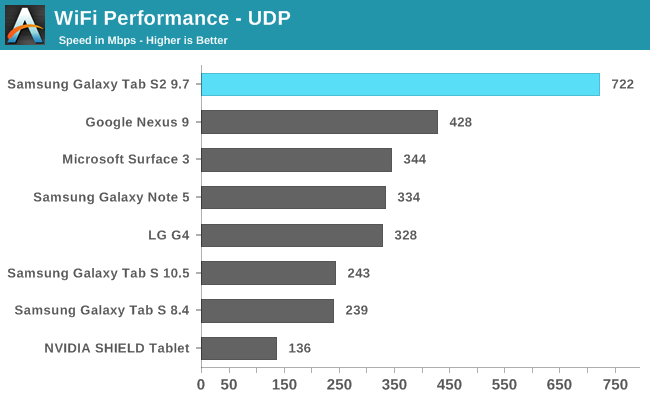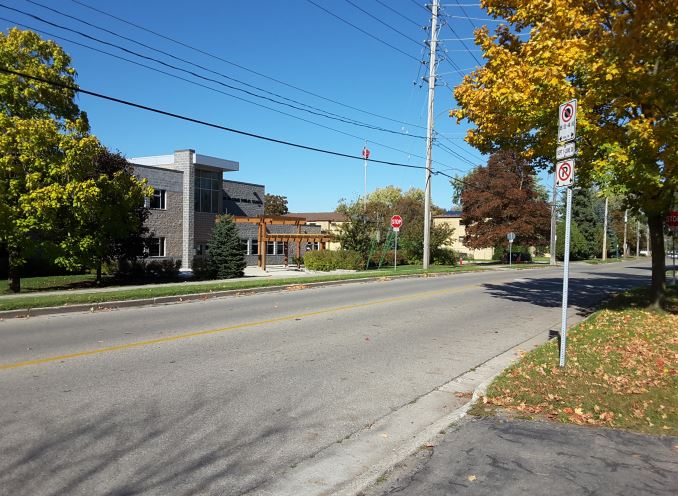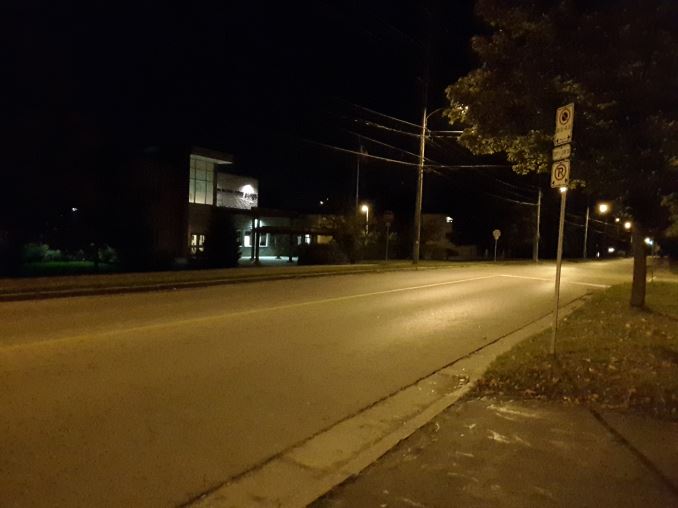The Samsung Galaxy Tab S2 Review
by Brandon Chester on October 15, 2015 8:00 AM ESTCamera: Photos and Videos
The number of users that use their tablet as their primary camera is far larger than anyone ever could have predicted when the tablet market was emerging. However, there are some obvious reasons why someone would opt for their tablet. It may actually be the best camera they own, and older users with aging eyes can definitely appreciate the fact that their tablet display turns into a giant high resolution viewfinder. The cameras themselves have also improved significantly from the dark days of the 1.2MP rear camera on the iPad 2.
Since the Tab S2 is extremely thin, Samsung has needed to allow for a camera hump in order to fit their 8MP sensor. The hump isn't very large, and although it's larger than that of the iPhone 6, it's not near as large as the camera hump on the Galaxy S6. It's honestly not really an issue, but some customers who are very serious about the design of their devices may take issue with it.
Below you can view the known specifications of the Tab S2's rear and front-facing cameras. Unfortunately I don't have data on the specific model of the rear-facing sensors used in the original Tab S series, so that info is omitted on the chart.
| Camera Specifications | ||||
| Galaxy Tab S1 Series | Galaxy Tab S2 Series | |||
| Front Camera | 2.1MP (1920x1080) |
|||
| Front Camera - Sensor | S5K6B2 (1.34 µm, 1/6") |
|||
| Front Camera - Focal Length | N/A | 27mm eff | ||
| Front Camera - Max Aperture | F/2.4 | F/2.2 | ||
| Rear Camera | 8.0MP (3264x2448) |
|||
| Rear Camera - Sensor | N/A (1.12 µm, 1/4") |
S5K4H5 (1.12 µm, 1/4") |
||
| Rear Camera - Focal Length | 32mm eff | 31mm eff | ||
| Rear Camera - Max Aperture | F/2.4 | F/1.9 | ||
While Samsung hasn't made any radical changes to the camera sensor specifications with the Tab S2, they have significantly widened the rear-facing camera's aperture. Changes to image processing and ISP improvements will also have an enormous impact on image quality.
As always, my photo testing begins with a scene during the day, followed by that same scene at night to test low light performance. While the low light test is still pretty brutal on current tablets, it's a very good indicator of the quality of an OEM's image processing.
During the day the Tab S2 performs very well. Detail is on par with the iPad Air 2, which isn't surprising given the similar sensors and Samsung's large improvements in image processing quality this year. My only complaint is that there is a bit too much sharpening going on which exacerbates the artifacting on the wall of the building caused by the limited effective resolution of the camera system. What's interesting is that the Galaxy S6 Edge processes the image with less sharpening, which is likely intentional on Samsung's part as the S6 has a much larger sensor with a higher resolution. Overall, I'm happy with the Tab S2's camera quality, and I'm glad Samsung decided to give the tablet a bit of a camera hump instead of crippling the camera quality to fit in the 5.6mm profile of the chassis.
Low light photography is where I started to have some issues taking photos with the Tab S2. For some reason it simply refused to run the autofocus, and I had to try and manually focus by tapping which is difficult on such a large device. Once I was able to focus and take the shot I took a few, and the best result is the one you see above. For a tablet it's actually a pretty good photo, although as you can see from the street lamps the photo is definitely overexposed to a degree. Compared with the iPad Air 2 there's actually not much more visible in the frame despite the overexposure, and the Air 2 has a better rendition of the grassy patch on the right side as well as the no parking sign. Both photos are still very good as far as tablets go, but I do think the iPad wins out by a little bit because of the exposure and slightly better detail preservation.
The Tab S2 can record video at 1080p30, and also at 1440p30 although the latter disables video stabilization and so I've opted to just use the 1080p recording mode. Looking back at all the tablets I've evaluated, it's clear that the Tab S2 has the best video recording quality by far. It's definitely not perfect, with some jiggle to the frames caused by the EIS and a bit too much saturation to the colors, but the overall quality, sharpness, and consistency of the frame rate is better than any other device I've tested.
WiFi Performance
Like the original Tab S, the Tab S2 ships with a 2x2 802.11ac WiFi implementation. I actually haven't been able to track down exactly which WiFi chipset they're using, which is unfortunate. The original Tab S actually had strangely slow WiFi performance given its peak theoretical bandwidth of 866Mbps, and I was hopeful that the Tab S2 would fare better.

As you can see, the WiFi performance on the Tab S2 is miles ahead of the previous models, and ends up having the highest peak bandwidth on record for a mobile device. Samsung did a great job improving on last year's WiFi implementation, and if there's going to be any bottleneck over WiFi it's not likely that t it will be the Tab S2.























162 Comments
View All Comments
nerd1 - Thursday, October 15, 2015 - link
App store vs millions of windows 'application' most of which users do not have to buy crappier mobile version again?osxandwindows - Thursday, October 15, 2015 - link
@nerd1Are there touch screen apps on windows tho?
osxandwindows - Thursday, October 15, 2015 - link
Why should I buy a surface pro if not for productivity then?KoolAidMan1 - Saturday, October 17, 2015 - link
Problem is that those desktop apps aren't optimized for touch interface. I'm running Windows 10 on my desktop and love it but I'm not ready to start using it on touchscreens yet.I'm eyeballing a Surface 4 Pro but can't justify it over a regular laptop right now.
osxandwindows - Sunday, October 18, 2015 - link
ExactlyThats why I am going to get an iPad pro.
hughlle - Tuesday, October 20, 2015 - link
No, you are right. There aren't really many apps. Why I just use full applications, which work just fine for me and touch. OneNote (because of the desktop inking issues) is the only app I use on the surface. Everything else I can do quite happily with the desktop software with finger and pen.osxandwindows - Thursday, October 15, 2015 - link
@zepiUtilityMax - Sunday, October 25, 2015 - link
Web browsing can be a HUGE hit. By far, the most processor intensive tasks on my Tab S 10. Web browser is where I normally see laggy performance, slowdowns, poor battery life, etc.Aenean144 - Thursday, October 15, 2015 - link
1. Apple designs and owns their processors. They contract Samsung to fabricate them or TSMC to fabricate them or both at the same time as is happening for iPhones per Apple's, for lack of a better word, drawings. Samsung can't use these processors. It's quite doubtful that they can even produce them independent of Apple knowing about it. If they do, the consequences will be quite severe, like Samsung not being able to sell any of those products virtually everywhere, except for maybe S Korea. And that's only if the S Korean gov't really really wants to take one for the team. And they won't.2. There are fairly competitive SoCs out there to the A8X or A8 in iPads today. So there are options, like Samsung's own Exyonos 7 series SoC. But, it looks like they really wanted it to be 5.6 mm thick. That has consequences and they gave up on have a largish battery and a more performant SoC to get 5.6 mm thick.
Don't think about half the performance, 0.15 lb less weight, 0.5 mm less thick, and maybe a third less runtime than the iPad Air 2 is worth it at those prices.
thedons1983 - Saturday, October 17, 2015 - link
Benchmarks are pretty much useless, when it comes to comparing everyday performance... You moronic pleb!!